Text
youtube
I vlogged some of my NAB experience this year. It was a great show (as always) and it was great hanging out with clients and friends old and new.
1 note
·
View note
Text
What a difference a little compositing can make. This shows the raw render vs 30 minutes of comp in After Effects. This is a WIP shot from my next TTC short! :)
0 notes
Text
I wrote a Fantasy story with AI and it's really boring.
Using @OpenAI 's #ChatGPT, I wanted to explore how the system would handle longer-form writing. So I went about prompting a short fantasy story that is both impressive and boring.
Right off the bat, I was impressed with the prose. It does a good job mimicking acceptable prose standards in the 21st century. Is it lacking character? Sure, but I'd argue a lot of fantasy writing these days lacks character. But that's a discussion for later.

Of course, this story needed to get interesting, so I had to steer it via the prompt. The reply is well-crafted but also obviously derivative (as all AI systems are)

Enough with the scene setting! Let's get into some action. I was interested to see how it handled dialogue and... This reads like a Marvel movie. Which is both a compliment to the AI and maybe a damning view of Marvel screenplays? (I like Marvel movies for the record).

As an aside, I was really impressed here with how it was able to recall information from earlier and continue to develop the story through the dialogue. I love a good cliffhanger, and the system did a great job here IMO. It's formulaic but it works.
I was hoping this next prompt would be awarded with a more clever payoff, but "clever" seems like a massive limitation to all creative AI I've experimented with.

Here's where the true test is. Can an AI draw it all together? Can it make the story mean something?

I had to really push it into making a firm conclusion and... Yeah, pretty basic. Pretty boring.

Overall, it's really neat I think. Prose and grammar are actually extremely classist, xenophobic mechanisms for gatekeeping in the writing/publishing industry, and this tool could really help storytellers who aren't highly educated tell stories that are more "acceptably written".
But, on the other hand, this reads very similarly to many highly-rated fantasy works (one of which I'm reading right now). But, again, is that more a compliment of AI or a damnation of modern fantasy lit?
Either way, if this experiment spooked you about AI taking over human creativity, check out this blog post from yesterday where I explain how that's not going to happen. And TBH, this experiment only reinforces what I said. Check it:
1 note
·
View note
Text
How I learned to stop worrying about AI Art.
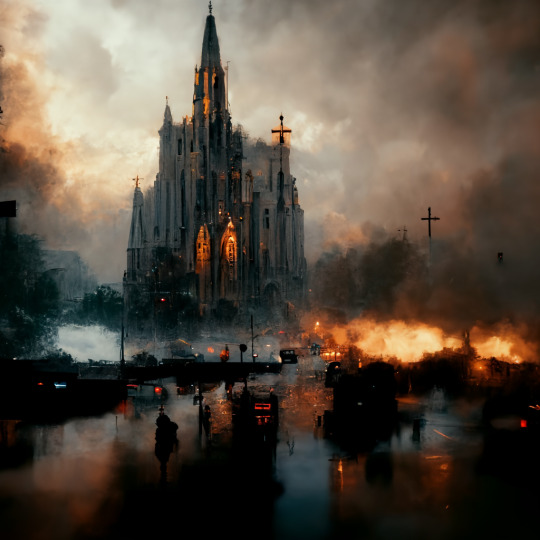
I've had so many thoughts on A.I. art as it has risen in public awareness. Recently it has reached a level of ubiquity where I've been seeing laypeople outside the art community creating some really cool stuff with AI tools.
I think the first instinct for any artist is to feel threatened. In 60 seconds, an AI was able to generate the image above, where something like this would take me days. Weeks, even.
Now, before I begin, these thoughts are taking in mind the numerous ethical concerns of AI art. Artists that are having their works used as training inputs will never see a dime or a lick of credit. Human biases are being trained into these AI platforms.
For example, type any input and use the word "man". Then generate that same input with "man" swapped with "woman". The pose, clothing, etc. will be drastically different because of the differences men and women are portrayed in art. It's often egregiously sexist/racist.
But those concerns are not under the purview of these thoughts. I think, as artists who feel threatened by AI Art, there is a significant amount of hope to be found in its rise.
See, since the day I arrived on the scene, the online art community has been obsessed with novelty. Novelty gets attention. Novelty gets likes and shares. People want to see things their eyes and brains have never seen before. It feels good in a world of monotony.
As a younger artist, I did exactly this. Weird simulation? Post it! Funky surreal-yet-photoreal render? Post it! People will love it. If it looks novel or vaguely provocative, it gets posted because novelty is rewarded. Always.
Most artists I follow built their following on novelty. But now A.I. art has made novelty abundant. Any person with access to Midjourney or Dall-e or even Craiyon can make something just as novel or surreal as the most technically gifted Instagrammer out there.
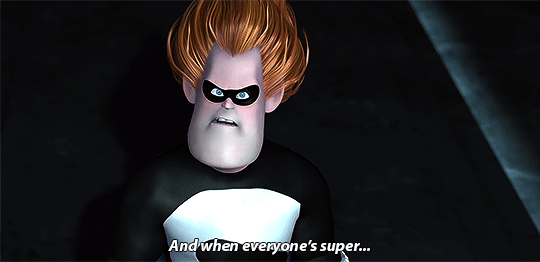
And when everyone's got access to unlimited novelty... Well, nobody is novel anymore. But is that really the end of human art? I think that conclusion is based on a misunderstanding of what art really is.
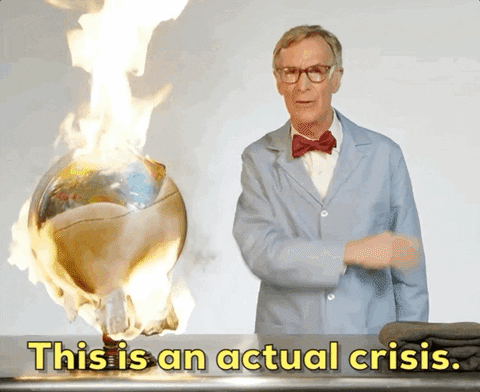
The rise of NFTs put many crypto-artists in a crisis that many of us watched in real time. They wanted to be remembered alongside Rembrandt and Jackson Pollock. Banksy and Warhol. But they were pushing very technical, usually abstract 3D renders that only really had novelty value.
The ensuing relational aggression between crypto artists calcified into a mantra that went something like this. "You can't just mint your usual renders, it has to have MEANING to be true art."
Well we all know how that ended. Turns out making art with "meaning" (whatever that means) is a lot harder than making something with 5 seconds of attention span worth of novelty value.
The truth is, the digital art world IS going through a crisis whether we know it or not. Artists whose entire livelihoods are based on novelty are in actual jeopardy because of AI art.
And as AI asset generation methods only sophisticate further, more and more jobs are going to disappear in art-heavy industries like marketing and game dev. But we're not there yet. And if you're an artist reading this, there's still time. And there's still hope.
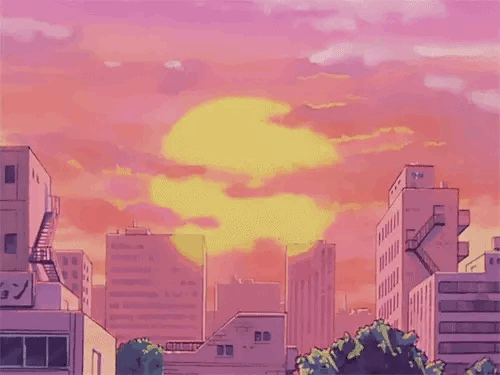
With an overabundance of novelty value in art, driven by this AI revolution, I'm willing to bet the "value" of novelty will plummet. We will be increasingly unimpressed by the increasingly fantastical images AI and artists are able to put in front of our faces.
Even now I'll see a matte painting in a movie that would have made me poop my pants in 2016. But now my reaction as an observer is "ah yes, another gorgeous, intricately detailed matte painting." There's no feeling there. The sight of a pleasing image is no longer compelling.
Ultimately, It's a damning view of how modern audiences parse media. The obsession with novel images is a far different view of art than people have had throughout history. Not to say art and novelty can't exist in the same breath. But those terms are not synonymous.
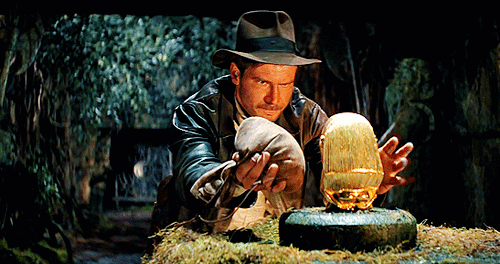
The golden nugget of truth buried at the core of all of this is that art is an expression of the human experience. Now, that's an impossibly broad definition, yet still untouchable by artificial intelligence because they lack the single qualifier to be able to make art. Being human. being sentient.
If AI had the power to make true art, it would be art that means something to other AI more than to us. (But that's a whole other conversation about the intersectionality of sentience I'm not going to get into in this thread).
AI can imitate. It can pretend. It can emulate. But until it is a bucket of neurons out in the world experiencing human life, pain, social structures, injustice, inequity, etc. it cannot make human art.
An AI does not understand grief. It does not understand what it's like to carry a child. It does not know the touch of a kitten's fur or the taste of Taco Bell on a road trip. AI does not know the unending pain of being a Browns fan.
Art is expression. An expression of life. Of every input processed by our hormonal, imperfect human brains.
I think A.I. art is exposing--HAS exposed--the lack of this in much of the human art we consume today. And soon it may not matter how beautiful an image or a sound is. What will matter is how much that sound or image means to someone else.
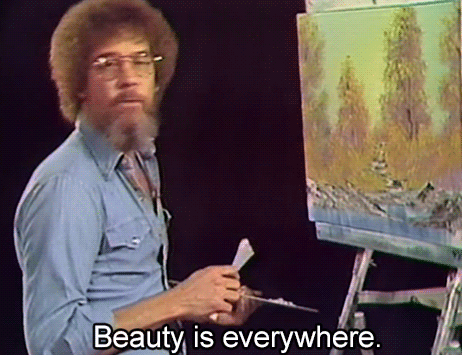
This is the new mandate for human artists. A mandate that I think has been neglected for a long time. To create, not for novelty value, but for the sake of connection. To take a piece of yourself and put it into words or colors or sounds and give it to the world. To create vehicles for emotional discourse.
In the end, AI art may have freed us from our own worst instincts. The way the nuclear bomb was a terrible thing that changed the way wars are fought, AI art is an anchor that will steer us into a new trajectory of human artistry.
It isn't without it's ethical dilemmas. But it doesn't spell the end for human artists. In fact, it just might be the beginning of something better.
0 notes
Note
Hey Mike! I'm really sorry to hear about your experience on Hill House. I do a lot of work in VFX in pre/prod/post and I know that sort of production that feels like a sinking ship day in and day out. I do hope you have found some catharsis now that it's over.
The show shook me. Changed me. Made me reckon with myself as a storyteller and as a person. All for the better, I assure you.
I hope to one day tell such an impactful story of my own, either through one of my short films, or through the novel series I'm writing/illustrating.
Which brings me to my question: How do you navigate the complexities of having authored a work that did so much harm to yourself but also did a lot of good for others? What lessons do you hope aspiring storytellers like myself take from your difficult experience? Thanks :)
Thank you for saying this.
It's true, HILL HOUSE was a very negative experience to make - but I will always be profoundly proud of the finished product. It's some of my favorite work. I may never again face down something as challenging as episode 6, and I love the impact it has on a lot of its viewers.
There's a weird thing that happens when you finish a project - it really ceases to be yours in any way at all. It belongs immediately to the audience, and they're given an experience that you will never have. When HILL HOUSE came out, I didn't watch it - I'd seen it hundreds of times by that point, but at the same time, I've NEVER seen it.
Every frame of it is informed by my experience making it, or my intentions, or the compromises we made here, or the line we cut there that I wish we'd kept, or a bad day on set, or a problematic actor, or a visual effect we never quite got right (there are a LOT of those in HILL HOUSE, some of them still make me wince.) So I'm never able to WATCH the show. It's a tradeoff we make all the time - if you're lucky enough to make a movie, or a TV show, that's the price of it - you'll never be able to watch it.
But, I get to see how it affects other people. More than anything else I've made, HILL HOUSE seems to have the largest and most passionate fanbase. (BLY is a close second, though that's a whole other blog entry - I could write a book about the complicated, fascinating experience of the BLY fandom).
But with HILL HOUSE, I'd hear a lot from people who lost loved ones, who navigate complicated family dynamics, and who have wrestled with depression or grief. It means the world to me. It's a strange divide, as I'll never see the show that they saw - but I am so grateful that it touched them the way it did.
I'm just about at the point where I think I'm capable of sitting down and truly watching HILL HOUSE. It takes years sometimes. I've watched a lot of my early work, like HUSH or GERALD'S GAME, and finally had the experience of really SEEING it. But HILL HOUSE has always felt a little too raw, and my memories still overpower my ability to separate myself from it. Maybe that's changed. Maybe I'll give it a shot this year. Half a decade seems like enough time.
But yes, it is complicated and strange with all of them. I so badly want to watch MIDNIGHT MASS, the project that was the most personal to me - but it flew off into the world just like they all do. I spent a decade working on it, and felt it flowing through me every day - like it was a part of me. But the moment the show was done and released into the world, it wasn't mine anymore, just like all the others. I remember feeling almost knocked over when it departed, for some reason I thought that one would always feel like a part of me... but no. They're like children, they all have to go live their own lives, and they don't belong to you. Not really.
494 notes
·
View notes
Text
ICYMI: My Halloween project this year was a surreal/spooky journey into an abandoned observatory. Shot and edited in 4 weeks and the production drained the entirety of my soul hahaha. Can't wait to show you all the fun projects in the pipes! :)
youtube
0 notes
Note
Incredible writeup from one of my favorite storytellers of our time.
Hello and Howdy Mr. Mike Flanagan! I'm excited to see you here on our humble hellsite. I have so much to say and ask about your netflix shows but for the moment, I want to ask about Doctor Sleep because I enjoyed that movie immensely - it filled me with a pleasant sense of dread, which possibly makes no sense, or a lot of sense.
What was that creative process like? Reconciling book and movie canons, following Kubrick's legacy, working with Ewan and Rebecca and Zahn and everyone else. I'm obsessed with King adaptations and I'm just fascinated with Doctor Sleep.
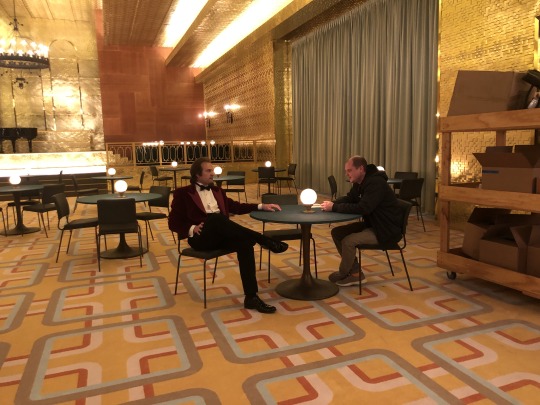
Alright! Buckle up for yet another long read.
Thank you for your question, and for this opportunity to go back and talk about DOCTOR SLEEP. It's a very special film to me, and a very special time in my life as well.

It all started with a general meeting with Jon Berg at Warner Bros.
The meeting itself started pretty wild - Adrien Brody walked out of the office as I was waiting to go in. Jon introduced us and we chatted for a few minutes, and I was a little out of whack for the rest of the meeting because I had a very potent "wow that was Adrien Brody" buzz going.
We were meant to talk about DC Comics and see if there was anything to do there. I was really hoping to chat about a horror-slanted Clayface movie, and about my favorite superhero: Superman.
Neither conversation went very far. I had just finished GERALD'S GAME, and Jon was a King fan, so he asked about the production. And then he asked if I'd ever read Warners' script for DOCTOR SLEEP.
I had. In fact, I had tried very hard to get a meeting at the studio when the book was first published. Warners owned the rights to DOCTOR SLEEP outright - it was part of their deal going all the way back to THE SHINING - so they immediately began looking into movie options when the book was published. Akiva Goldsman had written a script, and it was one of the first projects I asked about when I signed with WME as a client years before. "That isn't going anywhere," they told me. "I don't think that movie gets made."
They had tried to get me the meeting anyway, but no one at Warners responded. I never got in the room.
But now, here I was. What did I have to lose at this point?
"I did read it," I said. "I'd take a different approach." Jon sat back and smiled. "I love the book, Rose is one of the great villains of all time," he said. I agreed. He probed. "What's wrong with the script?"
"I don't think it follows the book closely enough."
"What would you do?"
"I'd do the book. Streamline it, combine some characters, and you'd have to rethink the True Knot a bit. But otherwise, just do the book. As long as it's a three-hander between Danny, Abra and Rose it'll work. With one big asterisk."
"What's that?"
"I think you have to bring back the hotel. Kubrick's hotel, I mean."
Jon smiled wider. "Yeah, it's a bummer the hotel burned down. King goes out of his way at the start of the book to emphasize that - no Overlook, look no further."
This was my biggest gripe with the book.
I said "When I read the book, all I could see was Kubrick's hotel. I think you do the book as close as you possibly can, until the big fight at the end. Instead of it taking place in an empty field, let it be in the hotel."
Jon: "Do you think King will be upset if you change his ending? You know how feels about THE SHINING, right?"
Me: "What if we gave him THAT ending? What if we let Danny have Jack's ending? Jack sacrificed himself to save his family and destroy the Overlook - why not let Danny do that? Change the ending, sure, but give him the ending Kubrick denied him."
We shook hands, and I called my producing partner Trevor Macy to tell him it was a good general, but nothing was coming out of my DC meeting. By the time I'd made it back to my car, though, Jon had reached out to Stephen King and asked if he'd be interested in me taking a swing at it. Steve, who had enjoyed GERALD'S GAME, said yes.
I was immediately petrified when the call came in that they might want to engage me on a rewrite of DOCTOR SLEEP, with a directorial attachment. I'd have to rewrite the script from scratch, and I kind of felt like they were calling my bluff. But the deal was made and quite suddenly I was adapting DOCTOR SLEEP.
First order of business was to make King aware of what I intended to do. I had just established a tentative relationship with my hero over GERALD'S GAME, and the last thing - the very last thing in the world I ever wanted - was to upset him. We weren't in direct communication, we spoke through agents and emails at this point - but I had to make him aware of the Overlook thing.
I put together a proposal that outlined what I wanted to do - use Kubrick's visual language, and keep the Overlook standing as a setting for the final battle. The initial feedback we got was "no." King really, really didn't like Kubrick's film, and his priority was to adapt DOCTOR SLEEP - not to revisit THE SHINING.
I told him that if he didn't want me to do it, I wouldn't - I'd walk away from the movie before I made something he hated. But as a last ditch effort, I said "imagine the Overlook, decrepit and rotten. And imagine Dan Torrance having walk in to 'wake it up,' the lights coming on above his head as he walks the halls. He finds his way to the Gold Room. To the familiar bar, where an empty glass is waiting for him. And we see a familiar bartender ready to pour for him, saying 'good evening Mister Torrance.' What if that bartender is his father?"
After a bit of a delay, King got back to us. "Do it," he said.
Writing the script was tough. I immediately felt like I had stepped into a very unsafe space. "This is going to piss everybody off," I figured. Kubrick fans would be livid that the movie was being made. King fans might be angry that Kubrick's imagery was being homaged. There was no way to please everyone, so I set about writing the movie I wanted to see most.
It was a slightly nauseous feeling that would stay with me until the movie came out.
I sat down to write with a hardcover copy of DOCTOR SLEEP to my right, and a hardcover copy of THE SHINING to my left. I read both cover to cover, sticking post-its throughout the pages with ideas, or flagging lines of dialogue (or even prose) that I wanted to protect. I managed to put together a basic outline for the movie, which was intimidating and sprawling.
I finally finished the draft and sent it off to Warner Bros. and King at the same time. I was shooting THE HAUNTING OF HILL HOUSE at the time, and thought it would take a long while and a few more iterations before SLEEP would go anywhere, if it ever did.
Warner Bros. shocked us all by coming back with a green light. I've been told that it was one of the fastest green lights in the recent history of the studio, and I believe it.
It happened so fast, in fact, that Steve hadn't read the script yet. I got an email from him on a Friday saying "I read the first half, and I absolutely love it - my son's getting married, so I'll pick it up in a week or so and finish it, but great so far!" I was nauseous... because I knew everything that King was likely to hate was in the second half.
When he finally did finish reading it, about a week later, he reached out and said:
"I think it's really good. In my experience, this is the kind of script studios don't make, because it's TOO good. Hopefully I'm wrong. But no matter how it turns out, thanks for treating me so well. - Steve"
I had the distinct pleasure of being able to write him back and tell him that Warner Bros. had just greenlit the movie. And we were off to the races.
The pressure was enormous. They were spending a lot of money on this movie, and because of the insane box office success of IT: CHAPTER ONE, expectations were very high.
We were given access to Kubrick's blueprints for the Overlook hotel set, which were still held at Warner Bros. While we set about rebuilding the sets, our attention turned to casting.
For Dan, we met with a handful of actors: Dan Stevens, Chris Evans, Matt Smith, and Jeremy Renner all came in to chat about the movie. But Ewan McGregor, who himself was eight years sober (just like Dan), was the obvious choice. "Let's not talk about the Shining yet," he said. "I want to talk about recovery." He was the guy.
For Rose the Hat, we talked with several actresses, including Anne Hathaway, Nicole Kidman, and my dear friend Karen Gillan - but Rebecca Ferguson knocked our socks off on a 90-minute zoom meeting, and the part was hers.
Finding Abra Stone was more difficult - we auditioned more than 900 girls for the part. We'd narrowed it down to a half-dozen very promising and successful young actresses, including Lulu Wilson (who I'd worked with several times before and adore), but Kyliegh Curran's self-tape audition rose to the very top of the pile. Ewan flew to Atlanta to read with our final picks, and when Kyliegh - who lived 15 minutes from our office, was local casting, and had never booked a job before - finished reading, he turned to us and said "I mean it's her, right?" It absolutely was.
When we cast her, we invited her back to the office after school one day to get oriented. The crew was so excited for her that they decorated the production office in her honor.
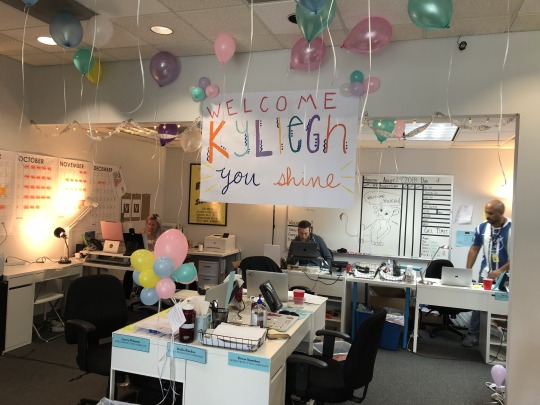
As the rest of the cast fell in, we started doing our camera tests and getting excited about what we were putting together. My feeling over overwhelming nausea only got stronger.
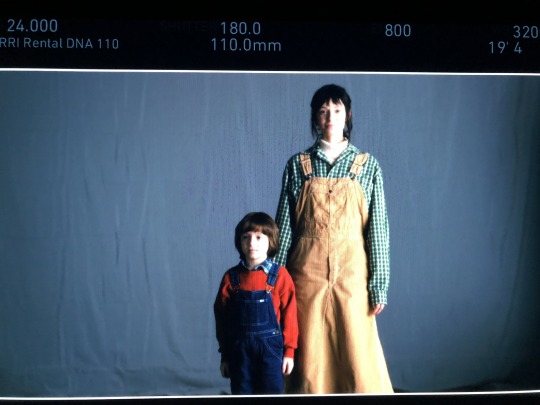
We started shooting in September of 2018. The shoot was long, but never exhausting. The cast and crew were uniformly pleasant and happy to be there, and after the soul-crushing slog that had been THE HAUNTING OF HILL HOUSE, it was a relief to enjoy working again.

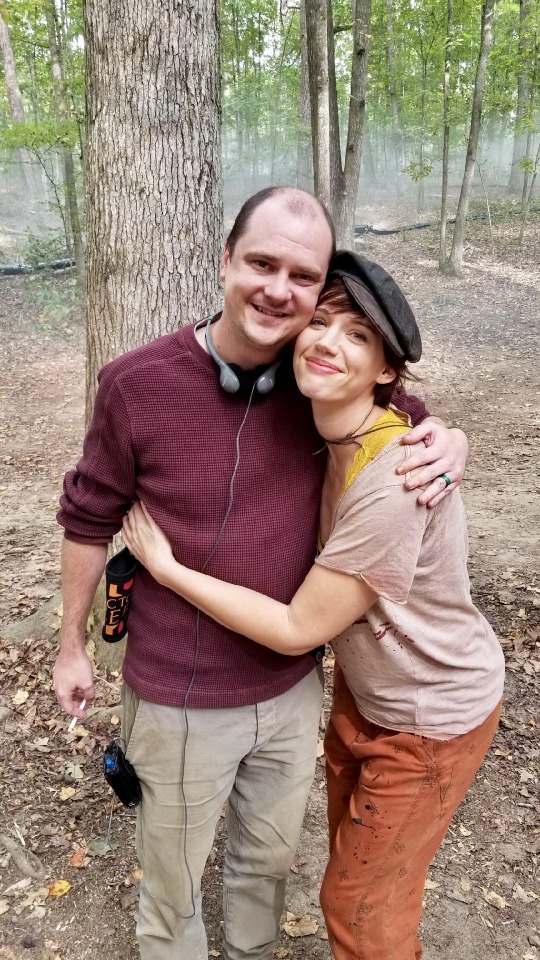
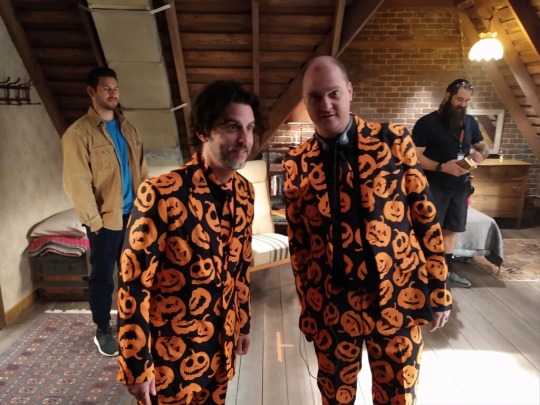
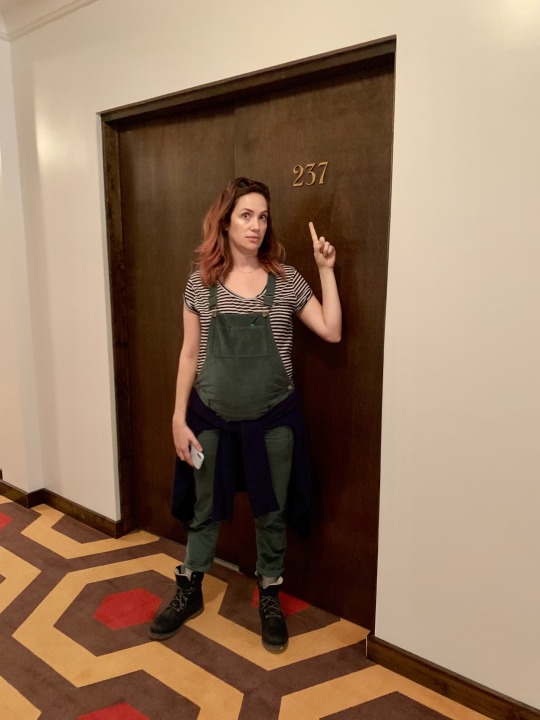
Kate was pregnant with our daughter Theo at the time. She visited as much as she could, but finally couldn't travel any more. Being away from Kate and our son Cody was hard, but I'm so grateful that we got to share some time on set together.
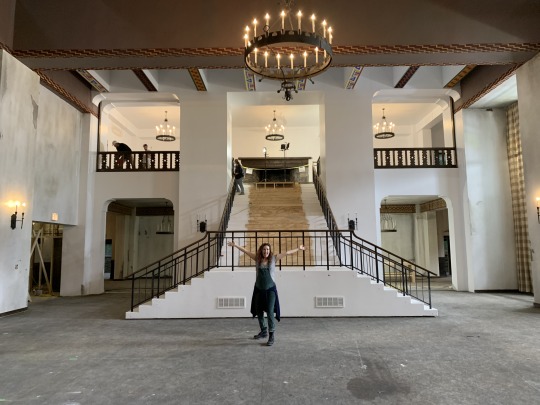

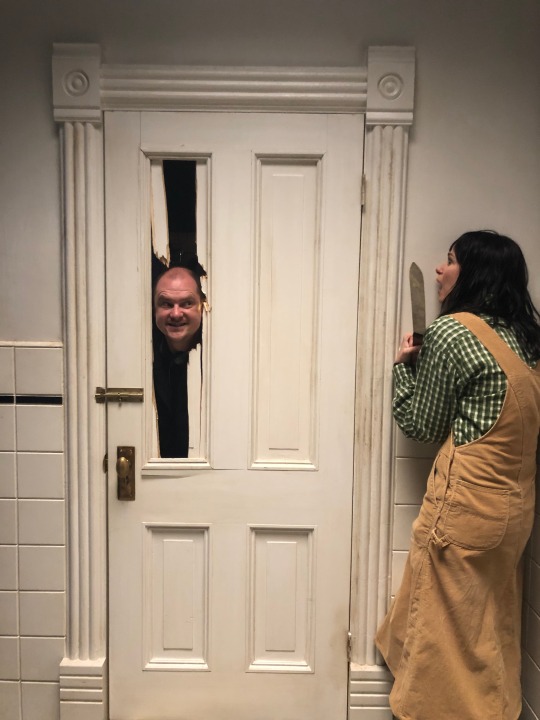

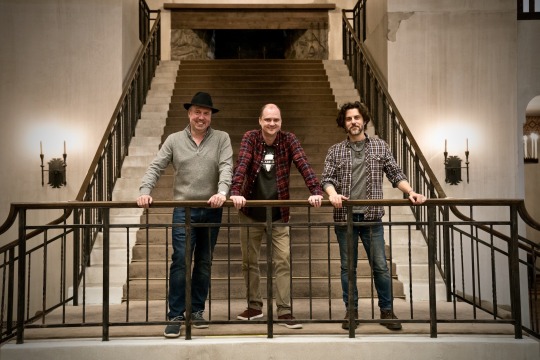
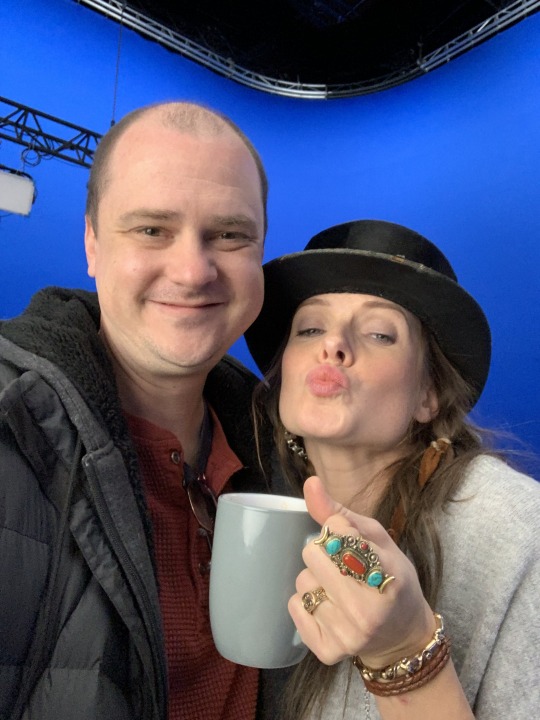
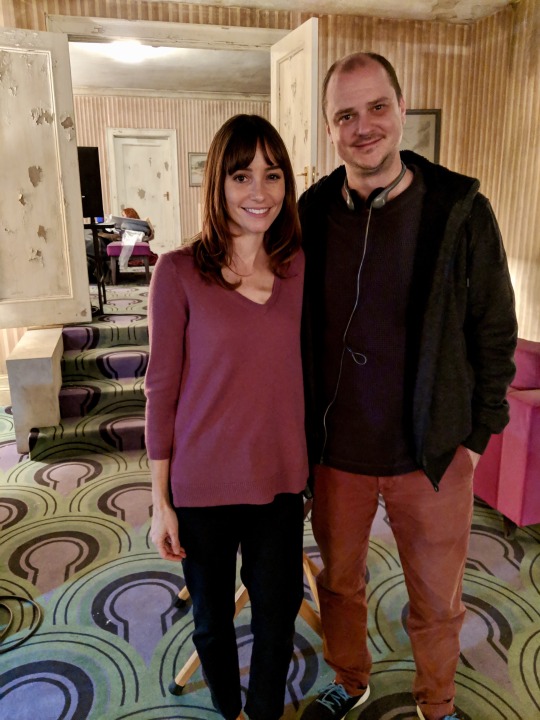
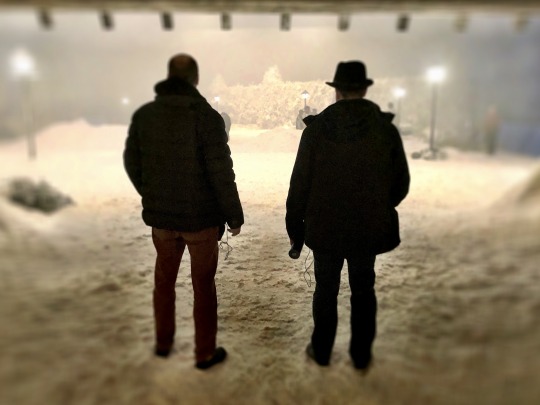
All things considered, this was a smooth shoot. But something happened for me while we were making it that would change the course of my life forever.
See, THE SHINING is about alcoholism. King wrote it while in the throes of his own addiction, and it is a novel about the anxiety he felt about what he could potentially do to his family if left unchecked. It's one of the reasons he was so upset with Kubrick's adaptation - all of that was taken away. This is a profoundly personal story for King.
When he wrote DOCTOR SLEEP, he was decades sober. The story of DOCTOR SLEEP is the story of recovery. This was something that Ewan knew very well, and why he was perfect for the part. He knew what the journey felt like. He wasn't alone - there were a number of cast and crew members on this shoot that were sober. In fact, just about all of the actors who played main characters were sober. I was still drinking at the time, though it had already become obviously problematic in my life, I hadn't taken any meaningful steps to change it.
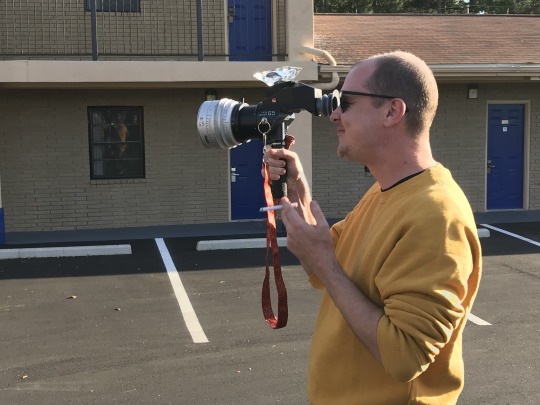
This photograph was taken on 10/12/2018. This was taken on the day I got sober. I quit cold turkey, in the middle of production. I was clinging to vices at the time. Note not only the cigarette in my hand (I was smoking almost 2 packs a day), but the ash tray that had been rigged to the top of my viewfinder by the camera department. (I don't smoke anymore either, just about four years without cigs as well... and I still miss them.)
I had been writing about addiction for a decade. It was all over my work, going all the way back to ABSENTIA. I didn't realize just how much I was writing about myself, and I still can't believe it took me this long.
I vividly recall writing the scene between Dan and Jack at the bar. My wife pointed out to me after the fact that she could see it then, that something was changing in me when it came to drinking. Something was waking up, and I was processing a desperate need to sober up. That scene represents an internal conversation that is profoundly personal to me. It's still my favorite scene of the movie.
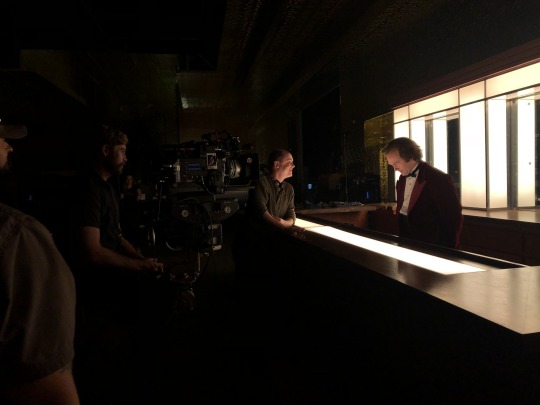
I've been sober now for over 4 years. DOCTOR SLEEP helped me finally make that decision. I finished the shoot sober, and came home to my life with a lot of uncertainty and insecurity. But with the unflinching support of my incredible wife, and some amazing friends, my life started to really blossom. It was pretty immediately evident that this was one of the best decisions I'll ever make.
Meanwhile, though, I had to finish DOCTOR SLEEP.
I LOVED the movie we'd made, but I was still terrified of what King would think of it - not to mention Kubrick's estate.
When we finished the cut, I flew to Bangor to screen the finished film for Steve. It was the first I'd meet him in person, and one of the most insanely exciting and humbling days of my life.


We watched the movie together, and I was acutely aware of each and every little reaction he had throughout.

(With Trevor Macy, my producing partner at Intrepid)
When the show as over, Steve turned to me and said "You did a beautiful job." And ultimately, he added that this film had made him warm up to the Kubrick movie as well.
A week later, we heard from Kubrick's estate that they had also loved the movie.
With King's blessing, and Kubrick's family, I felt that nausea finally subside. I said to Kate, "that's it. That's all that matters. Doesn't matter if the movie crashes and burns - we already won the important battle."
And then, the movie crashed and burned.

A group of us went to see it opening night at Arclight Hollywood (my favorite theater). We were just about the only people there. And I knew immediately that we were going to have a bad weekend.
The movie didn't perform very well. Warner Bros. was disappointed, and ended up scrapping the Dick Hallorann movie we were planning, as well as the Overlook Hotel prequel.
I was pretty crest-fallen. I'd spent years tossing and turning over whether audiences would be divided between the King and Kubrick camps. I'd been petrified that they'd be furious, venomous, run me out on a rail... I'd never considered that they'd be utterly disinterested. Apathy wasn't even on my radar.
Steve called me the Monday after opening weekend with some words of encouragement. "I remember when THE SHINING bombed," he said. "And SHAWSHANK. Give it some time. It'll find its audience. It's a really good movie."
That has turned out to be true. While it didn't set the world on fire theatrically, the movie has over-performed on VOD and streaming. And when Warner Bros. released the Directors Cut (I'm still so grateful that they did that), it popped even more.
So yes, to answer your question - the pressures were enormous. I hope this paints a little picture of what it was like. The biggest gift I got out of it, though, was sobriety.
I reached out to King a year later, on my first sober birthday. I hadn't told him I was sober, but it felt like time to do it. I got to thank him. "I never told you this, but I sobered up while we were shooting DOCTOR SLEEP, and I don't think I would have done it without your words. Living in that story, and marinading in the concepts of recovery and redemption made it possible. I just want to thank you."
He wrote back his congratulations, and then mentioned "as it happens, I'm off to celebrate 30 years myself. It only gets better and better."
And he is absolutely right.
DOCTOR SLEEP was the perfect project for me after the nightmare that was HAUNTING OF HILL HOUSE. I fell in love with making movies again. And I found a new and wonderful gear for my life. It has only had everything better - my marriage, my work, my experience walking around on planet earth. I'm so grateful for it.
When I think of DOCTOR SLEEP, I think of Ewan sitting at the bar and looking at the glass in his hand. "Man takes a drink, drink takes a drink... and then the drink takes the man. Ain't it so, dad."
Ewan understood those words better than I did when I typed them into the script. I understand them much better now.
There isn't a day that goes by that I'm not profoundly grateful for my time at the Overlook. And for myriad of ways my life has been changed because of it.
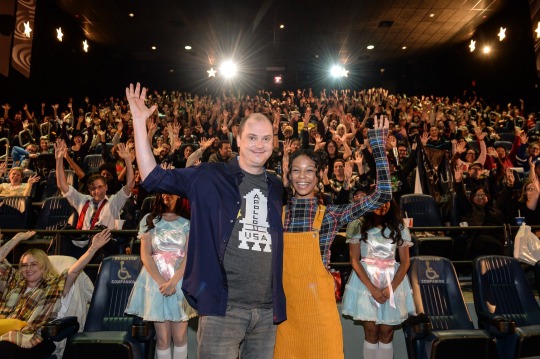
2K notes
·
View notes
Text
My 2021 reel. I know, a bit dated. But, hey, I've been busy! 2023 reel dropping soon 👀
youtube
1 note
·
View note